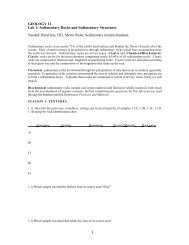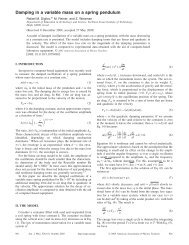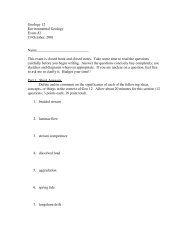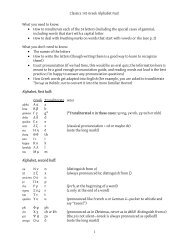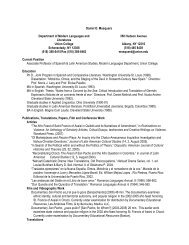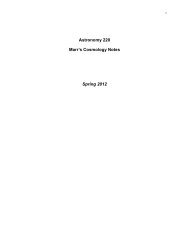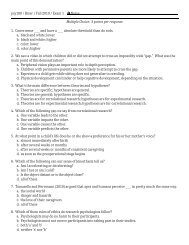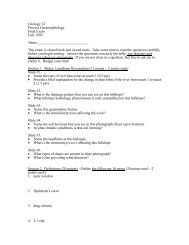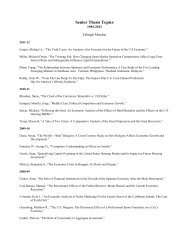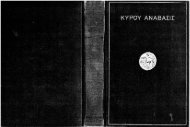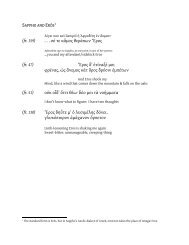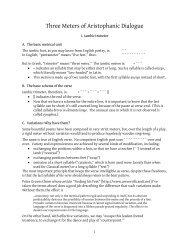Tarik Wareh Teaching Statement (Summer 2011) 1 ... - Union College
Tarik Wareh Teaching Statement (Summer 2011) 1 ... - Union College
Tarik Wareh Teaching Statement (Summer 2011) 1 ... - Union College
Create successful ePaper yourself
Turn your PDF publications into a flip-book with our unique Google optimized e-Paper software.
<strong>Tarik</strong> <strong>Wareh</strong><br />
<strong>Teaching</strong> <strong>Statement</strong> (<strong>Summer</strong> <strong>2011</strong>)<br />
“Lyric Poetry” I helped the students expand their comfort zone to achieve this. I believe those students<br />
of ours who have gone on to become Latin teachers and Ph.D. students in comparative literature and<br />
Classics got an important part of what they needed in such courses. In the same way, my individual<br />
research students have undertaken challenges beyond the normal curriculum, including<br />
interdisciplinary connections to such areas as mathematics, computer science, and Near Eastern history<br />
and religions.<br />
I have reached a wider audience in my two advanced Latin courses so far. In my Winter <strong>2011</strong><br />
course on Virgil’s Aeneid, students worked hard on traditional language skills but undertook a wide<br />
variety of projects intended to make them think in other, new ways. Students stretched their linguistic<br />
muscles by participating in the Latin Dependency Treebank project (an online framework for<br />
diagramming sentences to create a queryable database of syntactic structures); this involved the<br />
considerable challenge of learning the terms of dependency grammar, which was rewarded when we<br />
later were able to prove to ourselves the value of such advanced analytic terms as “verbal attribute” and<br />
“non-governed complement.” Even in a case like this—an experiment I probably will not repeat because<br />
of its sheer complexity—I am in no doubt that the students who participated in the experiment will<br />
have lifelong insights into how language works because of it. Students in this course also got ample<br />
inspiration and encouragement to synthesize our material in less purely linguistic ways. I was<br />
particularly pleased to see high-quality projects in which students explored how Virgil’s poetic lens as<br />
the author of an epic of national identity could be related to other historical experiences (the burning of<br />
the Schenectady Stockade) and works of art (from Beatnik poetry to the films of David Lynch).<br />
Another student’s project, “Coppola’s Godfather: Echoes of Virgil’s Aeneid in The Godfather,” was later<br />
presented to a regional audience at Hamilton <strong>College</strong>. I look forward to playing a greater role in coming<br />
years in teaching beginning Latin, where the larger student audience demands a special blend of<br />
popularizing fun and linguistic precision.<br />
Recent new contributions to general education: FYP and SRS<br />
I measure my successes according to the evidence that I have enabled and provoked students to<br />
reach high standards and challenge themselves. By this measure, my Winter <strong>2011</strong> First Year<br />
Preceptorial (“The Author as Sage”) can count several successes, together with indications for future<br />
improvements, and serves as a good example of how I have confronted myself and students with<br />
demands that awaken us to new possibilities. I voluntarily sought FYP as an important opportunity,<br />
despite its well-known challenges.<br />
I wanted the first-year students to understand from the beginning of their college experience<br />
that their education can be more than meeting narrowly prescribed expectations, a kind of performance<br />
in which the students are often well trained and most comfortable. For this reason I included in the<br />
course opportunities for them to choose their own direction and to serve as each other’s collaborators<br />
and discussants. This style of learning was made possible by the small class size of FYP and led to the<br />
development of ideas and arguments that better realized their own commitments and expectations of<br />
themselves. I believe that what students create to share with their fellow students not only enriches the<br />
academic atmosphere of the campus (it is a reason why I will be pushing in the future, not only for in-<br />
2



